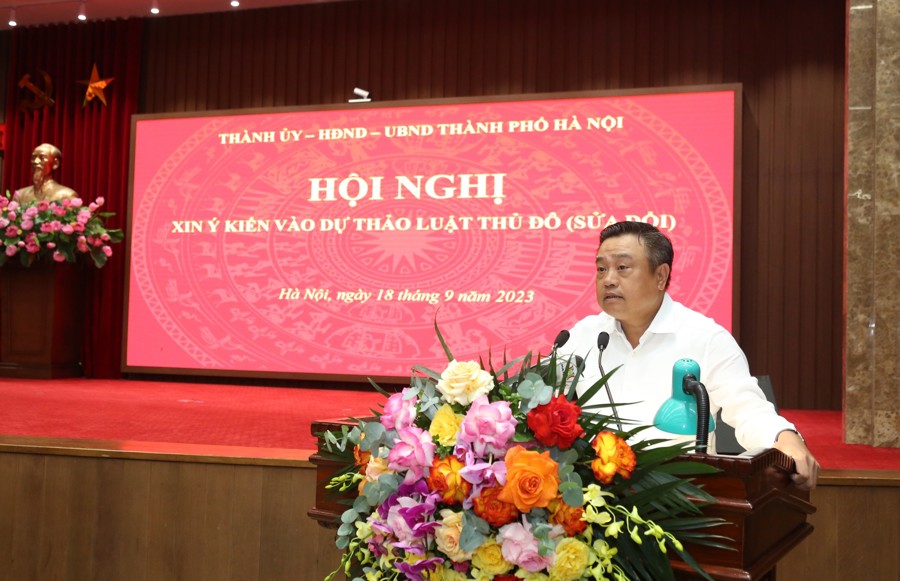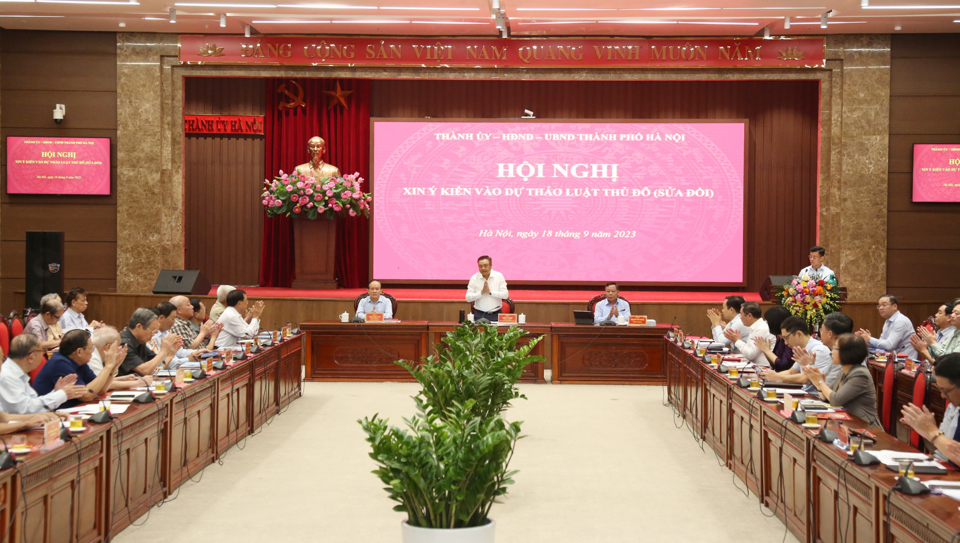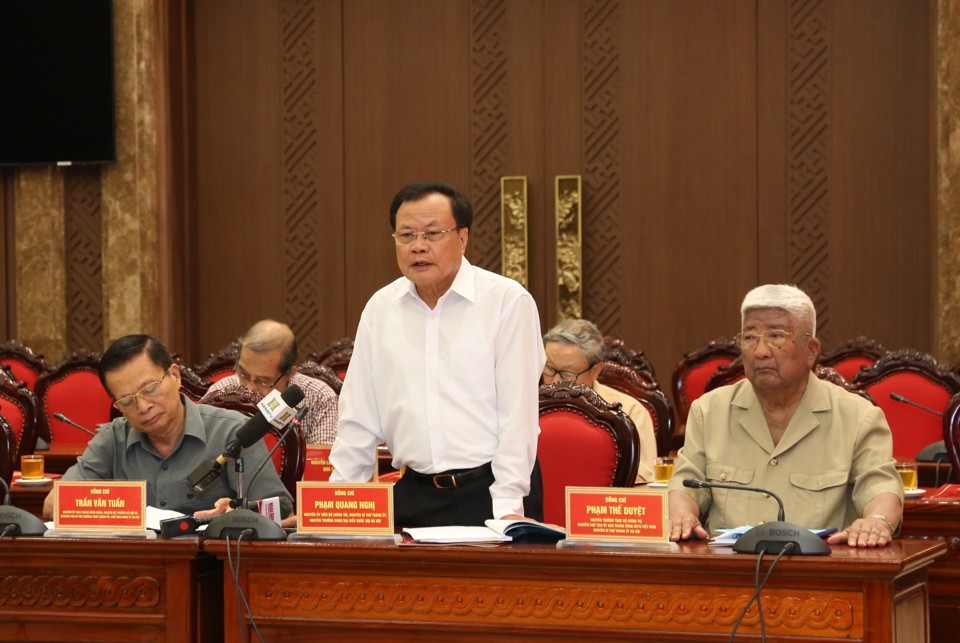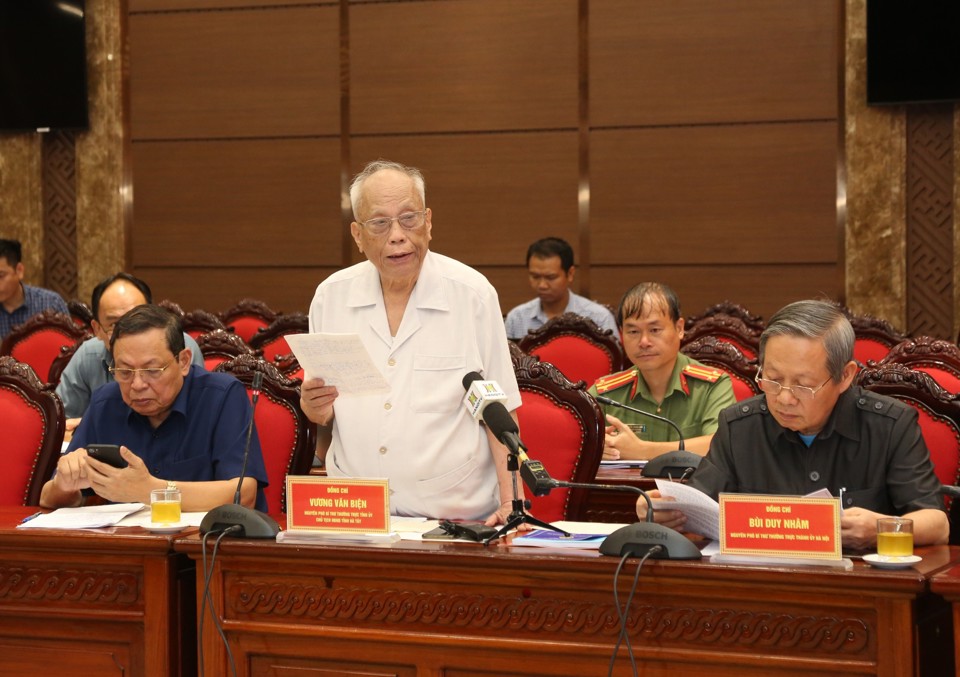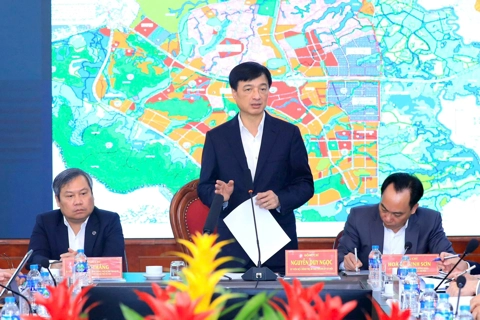Revising Capital Law opens door to Hanoi's prosperity: Mayor
The amended Capital Law strongly emphasizes decentralization, a reinvigorated governance model, and an enhancement of the capital's self-governance and accountability across all facets of its socioeconomic landscape.
The implementation of the amended Capital Law would pave the way for Hanoi to reach new heights in its development process.
| Chairman of the Hanoi People's Committee Tran Sy Thanh. Photos: Thanh Hai/The Hanoi Times |
Tran Sy Thanh, Chairman of the Hanoi People’s Committee, made the remarks during a meeting today [September 18] to discuss revising the amended Capital Law.
Thanh underscored the significant importance of the conference, stating that it serves as a pivotal foundation for the city's continued efforts in finalizing the amended Capital Law Project, which will be submitted to the 6th session of the 15th National Assembly in October 2023.
The city’s mayor pointed out that the law's primary aim is to address the challenges, obstacles, and shortcomings that have arisen during the implementation of the Capital Law since 2012.
Simultaneously, it seeks to enhance the legal framework, establish a distinctive and pioneering mechanism, and create favorable conditions for the growth and development of Hanoi as a capital city in line with its role and responsibilities as a political-administrative hub, as well as a significant center for business, culture, education, training, science, technology, and international integration.
“The goal is to transform Hanoi into a smart, modern, green, clean, beautiful, safe, and secure urban area, characterized by rapid, sustainable, and comprehensive development that catalyzes the progress of the Red River Delta, the key northern economic region, and the entire country,” Thanh said.
With these objectives in mind, the amended Capital Law Project aims to introduce exceptional mechanisms and policies tailored to meet the increasing challenges anticipated in the next phase of development for the capital. It will also delegate matters requiring legislative authority will be delegated to the relevant agencies by current laws, ensuring both feasibility and uniformity. Furthermore, the law will outline Hanoi's responsibilities and mechanisms for monitoring and controlling the exercise of powers and duties at all levels of the city's authorities. However, Thanh suggested that the amended Capital Law would build on the proven provisions of the 2012 Capital Law and integrate specific mechanisms and policies that have already been tested in provinces and tier 1 cities to suit the capital's context.
| Overview of the meeting. |
The scope of adjustments in the draft Law is primarily rooted in Article 1 of the 2012 Capital Law. This new draft Law elaborates on and supplements various aspects of government organization in the capital, budgetary matters, and resource mobilization for investment and development in the Capital and its interconnected regions, all within the limits defined by the Law.
Specifically, the Capital Law stipulates positions and roles, structures of government bodies, financial arrangements, budgeting procedures, resource mobilization strategies, and the overarching responsibilities for the planning, management, and protection of the capital itself, along with fostering development in the surrounding capital region.
The framework of the draft Law encompasses seven chapters and 59 articles, signifying an expansion of three chapters and 32 articles compared to the 2012 Capital Law. These provisions strongly emphasize decentralization, a reinvigorated governance model, and an increase in the capital's self-governance and accountability across all facets of its socioeconomic landscape. Notably, the principle of prioritizing the application of the Capital Law has been incorporated to ensure the Law's continued effectiveness, even in cases where subsequent laws and National Assembly resolutions introduce differing provisions.
"The amended Capital Law is a unique and pioneering piece of legislation. It introduces a variety of distinctive and innovative mechanisms, exerting a far-reaching impact that sets it apart from many existing laws and subordinate legal documents,” Thanh said.
Promoting Inclusivity in Capital Law
At the meeting, Former Hanoi Party Committee Secretary Pham Quang Nghi emphasized the need for the amended Capital Law to ensure inclusivity and its significant improvements compared to other laws.
He argued that the 2012 Capital Law lacks sufficient superiority regarding Hanoi's specific issues, such as complex consequences arising from violations like improper construction practices.
| Former Hanoi Party Committee Secretary Pham Quang Nghi. |
Nghi suggested that Hanoi should be permitted to set significantly higher fines, potentially even 50 times higher than in other regions and that this strict enforcement would act as a deterrent against violations.
Additionally, Nghi proposed increasing the authority of the Chairman of the Hanoi City People's Committee to surpass that of chairmen in other provinces and cities. This enhanced authority would come with greater responsibilities.
Regarding regulations for relocating hospitals, schools, and polluting facilities from the inner city, former Minister of Health Nguyen Quoc Trieu stressed that the amended Capital Law should ensure such relocations are feasible, appropriate, compliant with sector planning, and do not violate specialized laws.
“Specifically, in Article 29, relocation regulations for medical facilities should be carefully considered to ensure minimal disruption to healthcare services and an improvement in the quality of healthcare facilities in Hanoi,” Trieu said.
| Former Chairman of the People's Committee of Ha Tay Province Vuong Van Bien. |
Former Chairman of the People's Committee of Ha Tay Province, Vuong Van Bien, emphasized the paramount importance of environmental considerations in approving programs and projects for the capital.
He argued that even mega-investments should not receive licenses or approvals without ensuring environmental protection. Therefore, the amended Capital Law should address this aspect.
Additionally, Bien proposed that the Capital Law should establish higher construction standards for urban development, addressing issues like the construction of high-rise buildings in narrow alleys, which can impede access to fire trucks, as exemplified by a recent incident in Thanh Xuan district.


